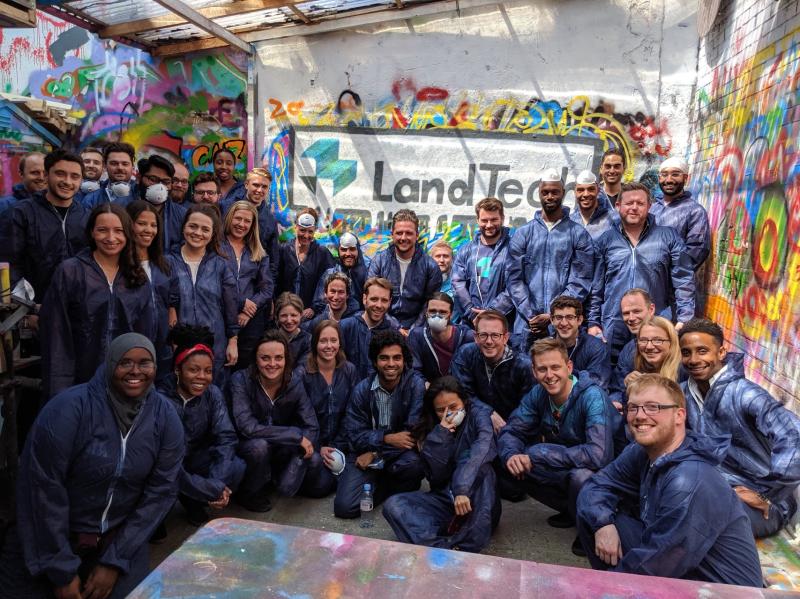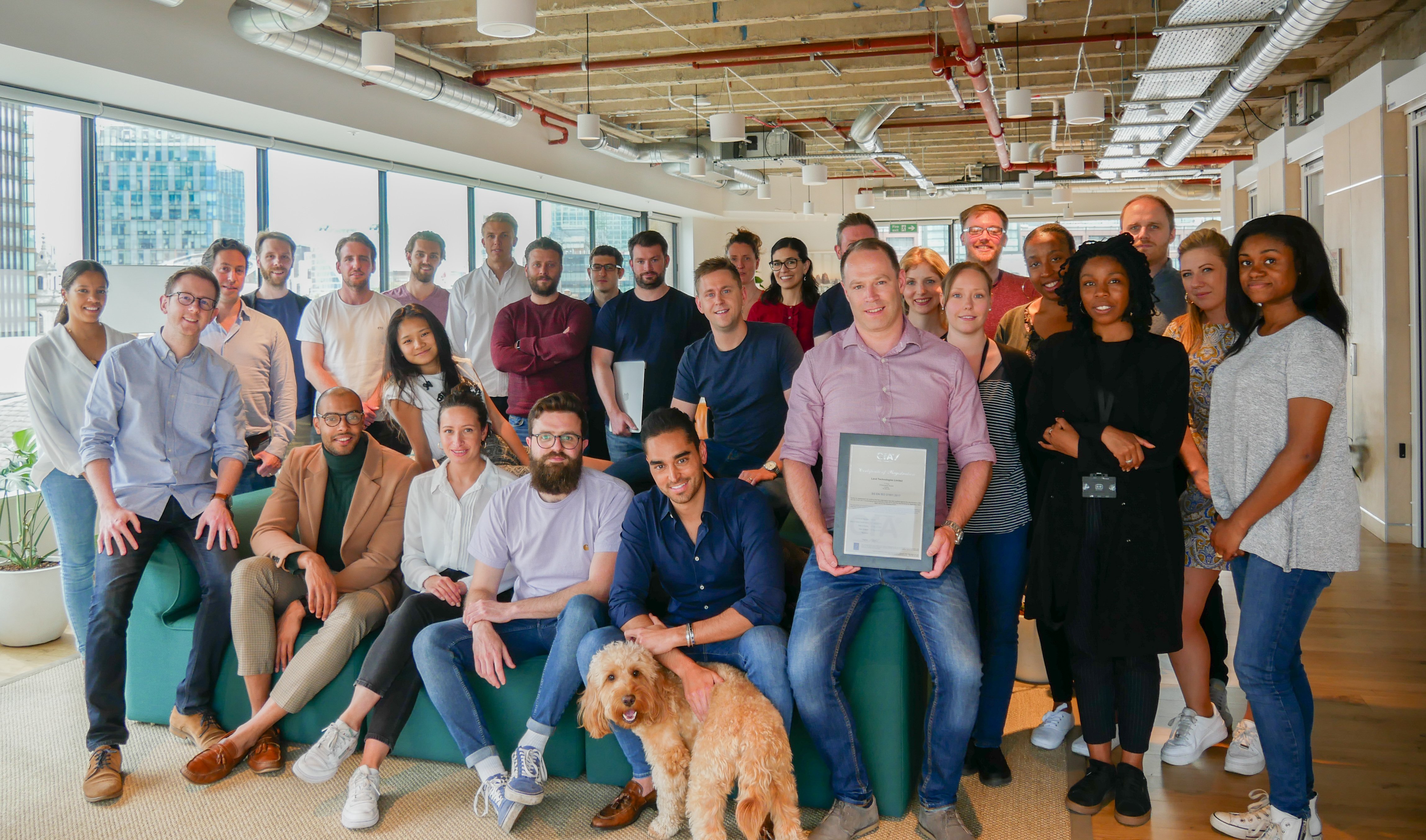The decision to rebrand is always a big one – it takes a lot of time and effort from across the entire company to get everything done.
So we decided to talk to the two people who led the charge on our rebrand – co-founders Jonny and Andrew.
We wanted to share what made them decide to rebrand, what they wanted to get out of it, and what they learnt along the way...
Q: Why now for the rebrand?
Andrew:
We’ve always been very mission-driven. When we started, that mission was obvious – to change the way people find and assess off-market land. So we built LandInsight.
But the more we worked on it, the more we realised that there were other huge pain points in the industry that went well beyond the scope of LandInsight.
But the more we worked on it, the more we realised that there were other huge pain points in the industry that went well beyond the scope of LandInsight.
Some of that came from talking to property professionals, hearing the kinds of issues they were facing every day. But there was another source of information – the data insights we were gathering.
We were bringing all this information together in one place, which meant we were able to see the problems – the missing information, the bottlenecks, the places where things could be so much better.
New ideas kept coming, new options opening up. New issues that, with the right focus, we could help to alleviate, or even fix altogether.
But they were all beyond the scope of what we were doing with LandInsight.
So we needed to make a change...
Jonny:
That was the big moment for us. Realising that trying to fit it all into a single product would make it feel overly complex. Trying to be all things to all audiences. And that’s not our style at all.
We want to make things easier for users, not more complicated by forcing them to use tools built for someone else entirely.
But that brought another big issue – the LandInsight name wouldn’t work anymore.
We needed a name that was all-encompassing. A name that really reflected the scope and ambition of what we were aiming for.
And thus LandTech was born.

Q: What made you go for “LandTech”?
Andrew:
It wasn’t actually a massive change internally. Our original company name was Land Technologies – it felt like an obvious starting point for a company using technology to help the land market. So LandInsight grew from Land Technologies.
As the LandInsight name got bigger and bigger, people became more familiar with it, so we leaned into it. But with these new products on the horizon, we knew we had to broaden out again.
LandTech was simply a slicker version of that original name.
Jonny:
It was also useful for us in the wider context of “PropTech”. We knew we were part of the PropTech umbrella, but that broader term also encompasses other aspects like the rental market or property maintenance which we don’t really deal with.
LandTech felt much more like it should be the category we belong to. So we decided to make it the name.
Q: How did you find the rebrand itself?
Andrew:
Initially, it was a little tricky – we were haunted by the fundamental question “do we even want to do this?”
When it became apparent that we had to do it, it kind of made things a little easier. Yes it was a lot of work, but now it was necessary work.
Then you start to get really excited by the idea.
Jonny:
Yeah, once we were committed to the decision and the reasoning behind it, so many options started to open up.
By taking a step back for a moment, we could really notice just how much “brand” impacted the whole company – from obvious things like visuals, the website, emails, right down to the fundamentals of who we are.
That meant a rebrand was not just a new logo and website, it was a chance to evaluate everything.
That meant a rebrand was not just a new logo and website, it was a chance to evaluate everything.
Andrew:
Definitely. We were working with an agency and talked to them about how keen we were to get something that truly puts across who we are.
Jonny:
When we set about choosing an agency, there were others we actually got on better with.
The one we finally went with were much more difficult. They challenged us. Forced us to look at things deeper. And we realised that was a really good thing.
They forced us to be braver. To have strong opinions. It was much more intimidating as a prospect, but it much better represents who we are.
Q: What was the most difficult/frustrating part of the rebranding process?
Jonny:
Oh that’s easy – while we were working on visual design, we randomly got sent info on another company that looked similar to where we were headed.
This makes sense – everyone’s using the same principles for how you design, how you build a brand etc.
Part of you wants to be 100% unique. But then you realise that people use these approaches every day because they work. It’s a bit foolhardy to write them off completely just to try and be ‘unique’.
That was a difficult realisation, but it was a good one to have early on.
Andrew:
It’s really tough to distance yourself from an old brand, especially when you liked it as much as we did.
You need to try and detach and go back to thinking objectively, the way you would have before you became emotionally attached to the old branding. What do we think good looks like? How do we remain objective?
Jonny used to use the analogy of an old pair of socks – they’re nice. Comfortable. You don’t want to lose them. But… eventually, there comes a point where you realise that they aren’t what they used to be anymore, and probably need something fresh.

Q: How have you managed the transition from startup to scale-up?
Jonny:
When you first start a business, you have to be a leader. From day one you have to be believable as someone who is going to change something. And that can be really tricky, because at that early stage there might not be a lot to back that claim up. You’re just someone with a big idea who’s willing to put in a lot of hard work.
But that belief, especially early on, is what allows you to build a team around you. And importantly, build a team that supports that vision.
And that’s what we were able to do.
Then you move from being a manager to hiring managers. You’re less involved in the minutiae, but have to keep control of that direction, keep all the teams pulling together, supporting each other, moving as one.
We use a whole host of strategies to achieve that – KPIs, OKRs and other acronym-based metrics that give us understanding and visibility over the whole company.
That’s what offers the whole team a strategic direction, and keeps everyone feeling unified in a core team – no matter how big we grow.
Andrew:
Culture-wise, the number one thing for us is being active about culture. It’s not something that just happens on its own.
Our company values aren’t just something that exist on a mission statement buried in a filing cabinet somewhere.
Our company values aren’t just something that exist on a mission statement buried in a filing cabinet somewhere. They’re active parts of the everyday experience here in the office, and we put a lot of work into thinking about them, evaluating them, and sharing them internally.
We have regular social events, company-wide get-togethers, weekly breakfasts, a birthday cake committee, regular informal presentations to the whole company… none of it just happens unless you make it happen.
And it’s bigger stuff too. We’ve had people working from around the world at different points, from New Zealand, Malaysia, the Philippines. We trust people – that’s why they got the job in the first place.
Jonny
Definitely – holding culture in high regard is so important, and that includes holding ourselves as co-founders to account for it too.
It is hard work, but you have to put in the effort.
It has to evolve, early-stage ideas don’t necessarily work at scale. But if you want to attract the best talent – and you really need to do that to achieve the best results – then it’s worth the effort ten times over.
Q: So what does the future hold for LandTech?
Jonny:
We want to help make the entire process easier – from finding and assessing land through to actually getting it built on.
We take the land on a journey and have software at every stage making the process simpler, and the final result better.
Eventually? Well, it’s not only in the UK – there’s a global housing crisis. Many of the best jobs are in cities, so you have mass migration into those cities.
More people fighting for properties means higher prices, but a more diverse population also means they have more diverse needs. To really appreciate that, and build what people actually want, we need to get a more diverse range of people involved in the development process.
Q: And lastly, how has the journey been from when you started with just the two of you up to this point – rebranding and launching new products?
Andrew:
I think for both of us it’s been a lot of fun.
Jonny:
Of course, it’s been challenging (even a bit torturous at times), but ultimately it’s been a journey of love – we’re so proud of everything we’ve built.
Working at LandTech is everything we could have hoped for in a job.
